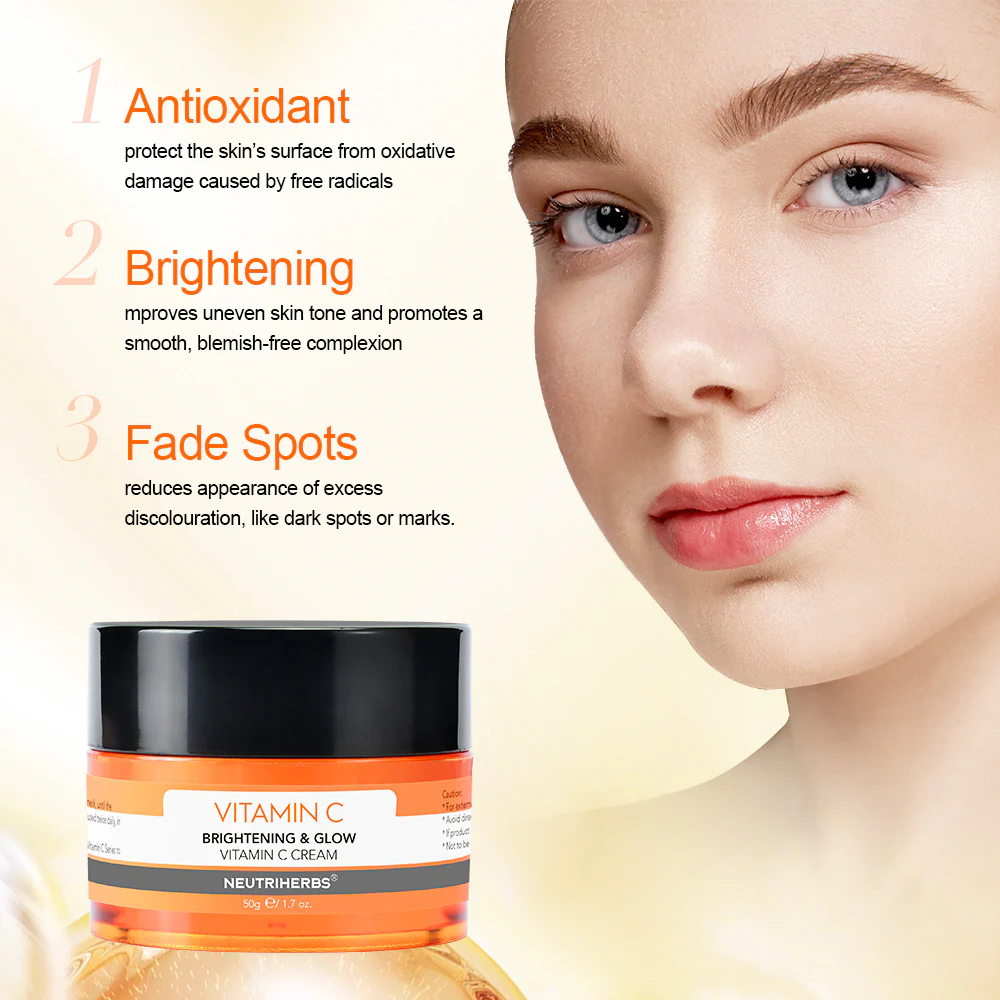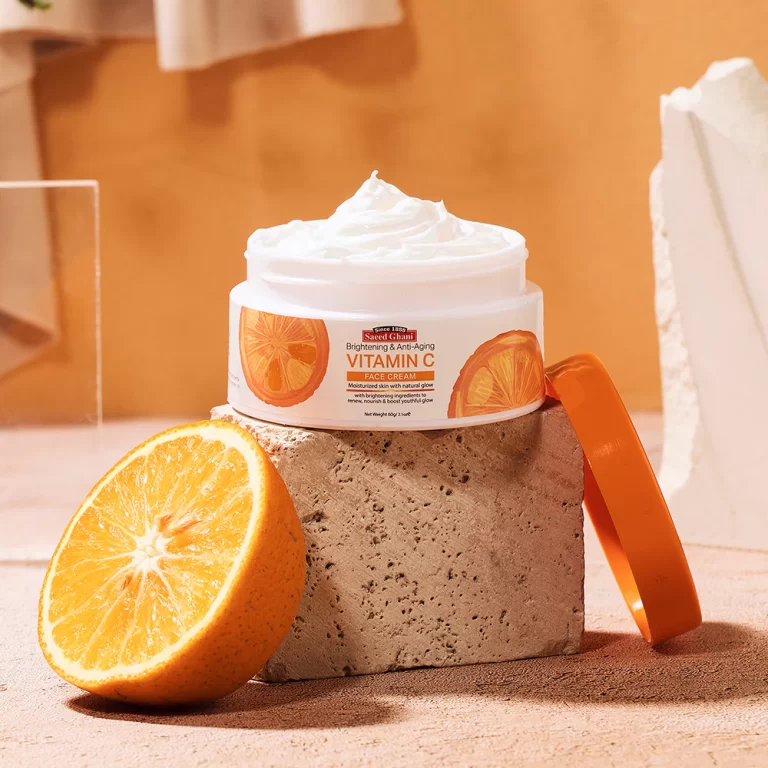
The Power of Vitamin C Face Cream: A Complete Guide
Understanding Vitamin C and Its Benefits for Skin
Vitamin C stands out as a powerhouse ingredient in skincare, offering numerous benefits for all skin types. This potent antioxidant plays a crucial role in protecting the skin from free radical damage caused by environmental stressors like UV radiation and pollution. Vitamin C also stimulates collagen production, which helps maintain skin elasticity and reduce the appearance of fine lines and wrinkles. Additionally, it brightens the skin by inhibiting melanin production, leading to a more even skin tone and reduced hyperpigmentation.
Vitamin C face creams harness these benefits in a topical form, allowing for direct application to the skin. These creams typically contain a stabilized form of vitamin C, such as L-ascorbic acid or its derivatives, to ensure efficacy. Regular use of vitamin C face cream can result in smoother, brighter, and more youthful-looking skin. Moreover, vitamin C enhances the skin’s natural defense mechanisms, making it more resilient to environmental damage. This versatile ingredient also possesses anti-inflammatory properties, which can help soothe irritated skin and reduce redness. For these reasons, vitamin C has become a staple in many skincare routines, with face creams being one of the most popular delivery methods.

Types of Vitamin C Used in Face Creams
Vitamin C face creams come in various formulations, each using different types of vitamin C. The most common and potent form is L-ascorbic acid, which is pure vitamin C. However, L-ascorbic acid can be unstable and prone to oxidation, leading to a shorter shelf life. To address this issue, cosmetic chemists have developed more stable derivatives of vitamin C. These include sodium ascorbyl phosphate, magnesium ascorbyl phosphate, and ascorbyl palmitate. These derivatives convert to L-ascorbic acid when applied to the skin, offering similar benefits with improved stability.
Another popular form is tetrahexyldecyl ascorbate, an oil-soluble version of vitamin C that penetrates deeper into the skin. Ethyl ascorbic acid is another stable derivative that offers excellent penetration and efficacy. Some face creams combine different forms of vitamin C to provide both immediate and long-lasting effects. The choice of vitamin C type in a face cream often depends on factors such as stability, penetration, and compatibility with other ingredients. Each form has its own strengths, and the best choice may vary depending on individual skin type and concerns. Understanding these different types can help consumers make informed decisions when selecting a vitamin C face cream.
Key Ingredients to Look for in Vitamin C Face Creams
While vitamin C is the star ingredient in these face creams, other complementary components can enhance its effectiveness. Ferulic acid, for instance, works synergistically with vitamin C to boost its antioxidant properties and improve stability. Vitamin E is another powerful antioxidant that pairs well with vitamin C, providing additional protection against free radical damage. Hyaluronic acid often features in vitamin C face creams, offering intense hydration to complement vitamin C’s skin-brightening effects. Some formulations include niacinamide, which works well with vitamin C to improve skin texture and reduce the appearance of pores.
Peptides are another valuable addition, supporting collagen production alongside vitamin C for improved skin firmness. Natural extracts like green tea or chamomile can provide soothing properties, making the cream suitable for sensitive skin types. Moisturizing ingredients such as glycerin or squalane help to lock in hydration and prevent dryness that can sometimes occur with vitamin C use. Some advanced formulations may include alpha-hydroxy acids (AHAs) or beta-hydroxy acids (BHAs) for gentle exfoliation, enhancing vitamin C absorption. When choosing a vitamin C face cream, look for products that combine several of these beneficial ingredients to maximize skincare results.

How to Incorporate Vitamin C Face Cream into Your Skincare Routine
Integrating a vitamin C face cream into an existing skincare routine requires some consideration. Typically, vitamin C products work best when applied in the morning, as they provide protection against daytime environmental stressors. Start by cleansing the face with a gentle cleanser to remove any impurities. If using a toner, apply it next to balance the skin’s pH. For those who use serums, a hydrating or hyaluronic acid serum can be applied before the vitamin C face cream to boost moisture levels. Next, apply a small amount of the vitamin C face cream, gently patting it into the skin rather than rubbing vigorously.
Allow the cream to absorb for a few minutes before applying sunscreen, which is crucial when using vitamin C products due to increased sun sensitivity. For those with dry skin, an additional moisturizer can be applied over the vitamin C cream if needed. At night, vitamin C face cream can be used after cleansing and before heavier night creams or oils. However, be cautious when combining vitamin C with other active ingredients like retinol, as this can sometimes lead to irritation. It’s best to alternate these products or use them at different times of the day. When first introducing a vitamin C face cream, start with every other day application to allow the skin to adjust, gradually increasing to daily use as tolerated.
Potential Side Effects and Precautions
While vitamin C face creams offer numerous benefits, they may cause side effects in some individuals. The most common issue is mild irritation, which can manifest as redness, itching, or a slight burning sensation. This reaction is more likely to occur in those with sensitive skin or when using high-concentration formulas. To minimize the risk of irritation, start with a lower concentration of vitamin C and gradually increase as the skin adapts. Some people may experience dryness or flaking, especially if the vitamin C cream is combined with other active ingredients. In rare cases, vitamin C can cause breakouts in acne-prone individuals. If any adverse reactions occur, discontinue use and consult a dermatologist.
It’s important to note that vitamin C can increase photosensitivity, making the skin more susceptible to sun damage. Therefore, always use a broad-spectrum sunscreen during the day when incorporating vitamin C into your skincare routine. Pregnant or breastfeeding individuals should consult their healthcare provider before using vitamin C face creams, as some forms of vitamin C may not be suitable. Those with specific skin conditions or allergies should also seek professional advice before starting any new skincare product. Lastly, be aware that vitamin C can oxidize when exposed to air and light, potentially losing its effectiveness. Always store vitamin C face creams in a cool, dark place and check for any changes in color or smell before application.

Choosing the Right Vitamin C Face Cream for Your Skin Type
Selecting the appropriate vitamin C face cream depends largely on individual skin type and concerns. For those with oily or acne-prone skin, look for lightweight, oil-free formulations that won’t clog pores. Water-based creams or gel textures often work well for this skin type. Individuals with dry or mature skin may benefit from richer, more emollient vitamin C creams that provide additional hydration. These formulations often include ingredients like hyaluronic acid or ceramides to boost moisture levels. Sensitive skin types should opt for gentler forms of vitamin C, such as sodium ascorbyl phosphate, which is less likely to cause irritation.
Creams with added soothing ingredients like aloe vera or chamomile can also help minimize potential reactions. For those targeting hyperpigmentation or uneven skin tone, look for vitamin C creams that include additional brightening ingredients like niacinamide or licorice root extract. Combination skin types might prefer a medium-weight cream that balances hydration with oil control. When choosing a vitamin C face cream, also consider the concentration of vitamin C. Beginners or those with sensitive skin should start with lower concentrations (around 5-10%) and gradually work up to higher percentages if needed. Always perform a patch test before fully incorporating a new vitamin C face cream into your routine to ensure compatibility with your skin.
The Science Behind Vitamin C’s Effectiveness in Skincare
The efficacy of vitamin C in skincare is backed by numerous scientific studies. Research has shown that vitamin C plays a crucial role in collagen synthesis, a process essential for maintaining skin elasticity and firmness. As an antioxidant, vitamin C neutralizes free radicals, which are unstable molecules that can damage skin cells and accelerate aging. This protective action helps prevent premature signs of aging like fine lines and wrinkles. Studies have also demonstrated vitamin C’s ability to inhibit melanin production, making it effective in treating hyperpigmentation and evening out skin tone.
The ingredient’s anti-inflammatory properties have been proven to reduce redness and inflammation, benefiting those with sensitive or acne-prone skin. Furthermore, vitamin C enhances the skin’s barrier function, helping to retain moisture and protect against environmental stressors. Research indicates that vitamin C can boost the effectiveness of sunscreens, providing additional protection against UV damage. The ingredient’s ability to promote wound healing has also been documented, making it beneficial for skin recovery. However, the effectiveness of vitamin C in skincare products depends on factors like concentration, formulation stability, and pH level. Scientists continue to research new delivery methods and combinations to maximize vitamin C’s benefits in topical applications.
DIY Vitamin C Face Cream Recipes and Their Efficacy
While commercial vitamin C face creams offer convenience and stability, some skincare enthusiasts prefer DIY options. A simple homemade vitamin C face cream can be made by mixing L-ascorbic acid powder with a base cream or aloe vera gel. However, it’s crucial to understand that DIY formulations may not be as stable or effective as professionally formulated products. One popular recipe involves dissolving vitamin C powder in distilled water or rose water, then mixing it with a moisturizing base like shea butter or coconut oil. Adding vitamin E oil can help stabilize the mixture and provide additional antioxidant benefits.
Another approach is to create a vitamin C serum by dissolving the powder in glycerin before adding it to a hydrating base. When making DIY vitamin C products, it’s essential to use them quickly, as they can oxidize rapidly without proper preservatives. Store homemade creams in dark, airtight containers in the refrigerator to prolong their shelf life. While DIY options can be cost-effective, they may not provide the same level of efficacy as commercial products due to potential instability and lack of supporting ingredients. Additionally, incorrect formulation can lead to skin irritation or ineffective results. Those interested in DIY vitamin C skincare should research thoroughly and consider consulting a skincare professional before experimenting.

Combining Vitamin C Face Cream with Other Skincare Products
Vitamin C face cream can be effectively combined with various other skincare products to enhance overall results. However, it’s important to understand which ingredients work well together and which combinations to avoid. Hyaluronic acid pairs excellently with vitamin C, providing hydration while the vitamin C brightens and protects the skin. Niacinamide, once thought to be incompatible with vitamin C, can actually be used in conjunction when formulated properly, offering complementary benefits for skin texture and tone. Vitamin E is another great companion to vitamin C, enhancing its antioxidant effects.
When it comes to exfoliants, alpha-hydroxy acids (AHAs) like glycolic acid can be used alongside vitamin C, but it’s best to apply them at different times of the day to prevent irritation. Beta-hydroxy acids (BHAs) like salicylic acid can also be combined with vitamin C, especially beneficial for those with acne-prone skin. However, caution should be exercised when using vitamin C with retinoids. While they can be powerful allies in fighting signs of aging, they may cause irritation if used simultaneously. It’s often recommended to use vitamin C in the morning and retinoids at night. Always introduce new product combinations gradually and monitor your skin’s response. If any irritation occurs, reduce frequency or consult a dermatologist for personalized advice.
Future Trends in Vitamin C Face Cream Technology
The future of vitamin C face creams looks promising, with ongoing research and technological advancements paving the way for more effective and stable formulations. One emerging trend is the development of micro-encapsulation techniques, which protect vitamin C from degradation and allow for controlled release into the skin. This technology could significantly extend the shelf life and efficacy of vitamin C products. Another area of innovation is the exploration of new vitamin C derivatives that offer improved stability and skin penetration.
Researchers are also investigating synergistic combinations of vitamin C with other antioxidants and active ingredients to enhance overall skincare benefits. The use of liposomal delivery systems is gaining traction, potentially improving the absorption of vitamin C into deeper skin layers. Additionally, there’s growing interest in combining vitamin C with probiotics or prebiotics to support the skin’s microbiome while providing antioxidant benefits. Smart packaging that protects vitamin C from light and air exposure is another area of development. As sustainability becomes increasingly important, we may see more eco-friendly formulations and packaging options for vitamin C face creams.

